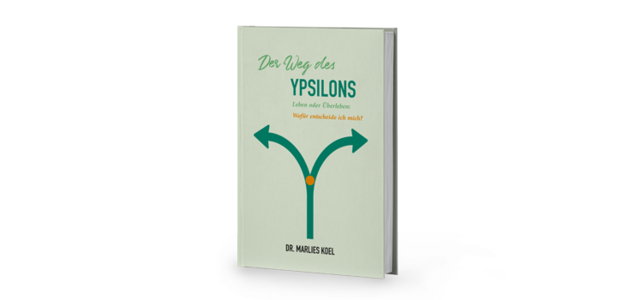“The way of the Ypsilon” is an ideal guidebook for readers who are willing to hold up a mirror to themselves regarding their own behaviour and to question themselves.
Stefan Beck, Pressebeck.de
Würzburg – 19 February 2020
How do I decide – and how do I experience and evaluate my situation? What criteria do I use to orient myself? Do I retreat into my shell, or do I even go into conflict? Or: Which shirt do I put on this morning? And what do I prefer or not prefer to eat?
Every person takes hundreds of decisions every day. But every time we must take a decision and don't know what to do, we face a dilemma. To solve this problem, Dr Marlies Koel has developed an easy-to-implement technique. With this technique we can make every decision and its effect perceptible for us on the body level.
In her book, published in October 2019, she differentiates between the survival path “The glass is half empty” and the life path “The glass is half full”. The so-called crossing point at the “Y” is the place where we decide: Do we turn left or right? The left path stands for the “survival path”, the right for the “life path”.
“The way of the Ypsilon” is an ideal guidebook for readers who are willing to hold up a mirror to themselves regarding their own behaviour and to question themselves. Since every person seeks meaning in life, but often wants to receive it from others, the question arises: What if every person already found meaning for himself in his own life?
The author makes clear: Conflicts are often based on a lack or a grievance, i. e. on unmet needs. As long as somebody experiences a lack himself, but the environment is supposed to eliminate it, stress and conflicts are inevitable. As so often, the key to a happy and fulfilled life lies with us.
The benefits for the reader are manifold: “The way of the Ypsilon” inspires, provides more clarity, and challenges us to rethink. Becoming aware that in the past we made destructive, unfavourable decisions for us – declared as wrong – in life, although we could have decided differently, also means that we may very well choose a different option in the future – as long as we are free, courageous and willing to leave our own comfort zone.
The book contains valuable questions for the reader, knowledgeable testimonials from Dr Marlies Koel's practical work, and enlightening insights and conclusions. Her mantra is: We can leave the “well-worn path” at any time and do not have to constantly operate in “survival mode”, even if it has helped us in risky situations. But to experience ease and joy in our everyday life, this attitude to life is not suitable. Because we really don't have to fight in every situation – “for survival”.
Listening more to ourselves, relying on our own intuition, staying in touch with our feelings, taking more time for ourselves – these are the author's recommendations. Such important skills we have often “trained away” in the course of life, even if they are often still “slumbering” beneath the surface. She explains: “We are not the victims of our circumstances. No matter how bad or good our childhood was, we can always make new choices.”
Dr Marlies Koel knows how to explain even complex issues in easy-to-read language and present the challenging subject in a compelling way. The good thing is: The reader needs neither prior knowledge of psychology nor medical expertise. The book contains numerous case reports, takes up various aspects of our emotional life, and that is also what makes it so valuable to read. It helps to solve professional challenges and is equally suitable for personal issues.
“The way of the Ypsilon” gives courage, inspires confidence, and even makes the reader smile at some points when realising: This has happened to me so many times, and every time I could... well, this is human. And somehow we are almost all in the same boat.

